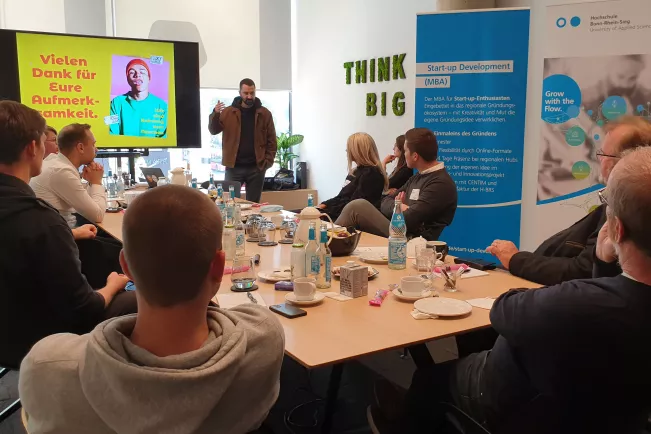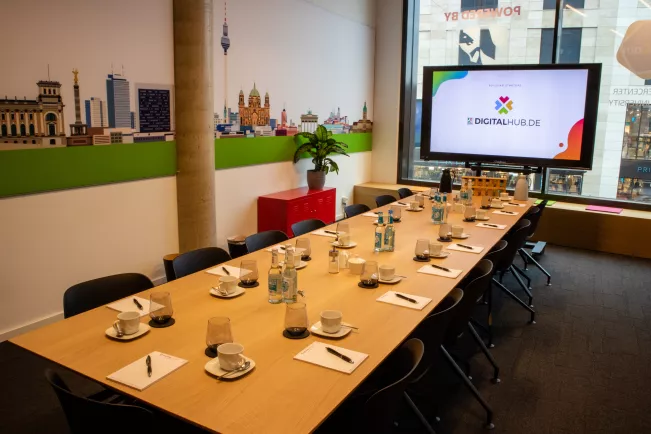Start-up Development and Impact Innovations (MBA) - discontinued
Teaching and exams
Teaching

Practical teaching is consistently implemented in the curriculum by relating the content and assignments within each module to the students' individual innovation. In this way, the students' own start-up or innovation project can be continuously developed over the course of the programme.
The design of the Master's programme encourages students to take responsibility for their own learning process and ensures the necessary independence through a high proportion of self-study. The courses are both structured and flexible. By organising the online courses MBA Connect predominantly outside normal working hours from Monday to Thursday from 5 p.m. and the presentation dates on selected weekends in the semester on Friday afternoons and Saturdays, the MBA is geared towards the individual needs of working students.
In order to ensure that teaching is up to date, at least 50 per cent of the lecturers are from (start-up) practice. The MBA therefore not only utilises the advantages of digital teaching, combined with face-to-face sessions for direct application and networking, but also the latest knowledge from the start-up ecosystem.
Additional benefits for our MBA students
Online and blended learning modules

MBA Connect on up to three dates per semester
- Online kick-off at the beginning of the semester: Content impulse/input and distribution of tasks
- Up to two online check-ups and Q&A sessions
- Supplementary face-to-face appointment possible
The dates will be announced in good time before the start of the semester.
Presence modules

The interactive classroom courses take place on Friday afternoons and Saturdays on two weekends each semester. The dates will be announced in good time before the start of the semester.
► Entrepreneurial Skills l - Purpose and Behaviour (1st semester)
► Entrepreneurial Skills II - Digital Presentation and Communication (4th semester)
Teaching methods

- Presentations and guest lectures
- Ppractical courses, case studies and group work
- Excursions
- Flipped Classroom
- Online lectures and On-demand teaching
- E-learning components (including online scripts, videos, links, podcasts)
- Discussion- and scenario-based learning
- Interactive workshops
- Business plan development
- Practical courses and case studies
- Individual one-to-one and group coaching
Teaching benefits
- Students develop their own start-up or innovation project in each module
- Practical application
- Networking
- Direct feedback from lecturers and fellow students
- Experiencing personal development
Exams

Each module concludes with a module examination at the end of the course. The examination period is at the end of each semester, directly after the lecture period. The individual exam and submission dates will be announced in good time. In each module, students acquire internationally recognised and transferable credit points (ECTS) and the modules are assessed either with a grade or "pass"/"fail". The standard period of study is five semesters for part-time students or four semesters in the fast-track model. In the accelerated version, students have the opportunity to study the modules of the regular 4th semester on-demand and take the examination results in semesters 1 to 3.
No written examinations. Instead, the focus is on direct application instead of memorisation. The module examination can often be completed during the semester. The respective examination type of the modules is specified in the module catalogue and is largely limited to the following examination types:

Online and blended learning modules (graded)
- Oral individual or team presentations + submission of a portfolio / (e)-portfolio (in the case of own start-up or innovation project, the assignment refers to this; alternatively to a fictitious module-related project topic)
► These modules conclude with an oral presentation of the portfolio in the forum (online or in person). The feedback on the digital presentation can then be incorporated into the final version of the portfolio before submission.
Presentation modules (ungraded)
- Practical course and minimum participation in events
- Presentation
Benefits exams
- Examination results for graded modules (portfolios) are application-orientated and relate to the student's own project.
- Students' start-up or innovation project can be further developed during the semester.
- Definition of standardised examination types for more predictability.
- Improvement of digital presentation skills.
- Lived feedback culture: direct feedback from lecturers and fellow students.
- Personal development through constructive experiences and self-organisation
The specific dates for the online and classroom courses in the first semester will follow within the next few months. All information, including an overview of lectures and information about the rooms, can be found in LEA for enrolled students.